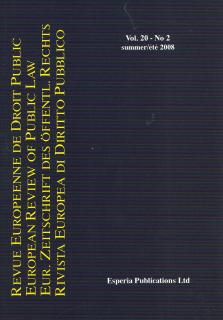
La spécificité du standard juridique
en droit communautaire
(The Specificity of the Legal Standard in European Law)
Maître de conférences à l’Université R. Schuman de Strasbourg
In the field of Community law, the “soft”, “flexible” notions, the “words of various meanings”, whose content is not determined by their writer but by their interpreter, are numerous. Among these “vague” notions, some, both conceptual and functional, are intentionally undetermined because they allow an assessment of behaviours and conditions in terms of normality, and require for their application in specific cases, references exogenous to the law in order to be applied in particular cases. This is the case, for instance, of the notions of “responsible tenant”, “good moral standars”, “reasonable time”, “misuse of law”, “legitimate expectations” or even of the “public order”. This particular type of undetermined notion constitutes a standard. The question is to know whether, and to what extent, these standards present particularities in the legal system of the European Union, regarding their substance, that is their content, and also their function. First, it seems that the substantial specificity is a partial one. Actually, some standards are marked by a strong Community bent as far as they concern the hardcore of the Community integration and the distribution of competences within this legal system (in particular, the notions of subsidiarity, and of reasonable cooperation). On the contrary, other standards have a substance close to the one that has been attributed to them in the national or international legal systems, although they are adapted according to the logic of this Community system (for example, this is the case of the legitimate expectations, of the good governance, or even of the fair trial). It seems, then, that the functional specificity of the Community standard is obvious. This type of undetermined notion plays, actually, a role related not only to the particularities of the jurisdictional system of the Union and to the judge’s contribution to the European integration, but also related to the structural particularities of the Community legal system.
En droit communautaire, les notions “souples”, “élastiques”, les “mots à sens multiples”, dont le contenu est déterminé non pas par leur auteur mais par leur interprète, sont nombreux. Parmi ces notions “floues”, certaines, à la fois conceptuelles et fonctionnelles, sont intentionnellement indéterminées parce qu’elles permettent une mesure des comportements et des situations en termes de normalité et nécessitent, pour leur application aux cas d’espèce, des références exogènes au droit. C’est le cas, par exemple, des notions de “bon père de famille”, de “bonnes mœurs”, de “délai raisonnable”, d’“abus de droit”, de “confiance légitime”, ou encore d’“ordre public”. Ce type particulier de notion indéterminée constitue un standard. La question se pose de savoir si, et dans quelle mesure, les standards présentent des particularités dans l’ordre juridique de l’Union européenne, du point de vue de leur substance, c’est-à-dire de leur contenu, et du point de vue de leur fonction. Il apparaît, d’abord, que la spécificité substantielle du standard n’est que partielle. En effet, certains standards sont marqués par une forte coloration communautaire en ce qu’ils touchent au noyau dur de l’intégration communautaire et à la répartition des compétences au sein de cet ordre juridique (les notions de subsidiarité, de coopération loyale notamment). D’autres standards, en revanche, ont une substance proche de celle qui leur est attribuée dans les ordres juridiques nationaux ou internationaux, tout en étant adaptée à la logique de l’ordre communautaire (c’est le cas, par exemple, des notions de confiance légitime, de bonne administration, ou encore de procès équitable). Il apparaît, ensuite, que la spécificité fonctionnelle du standard communautaire est manifeste. Ce type de notion indéterminée joue, en effet, un rôle lié non seulement aux particularités du système juridictionnel de l’Union et à la contribution du juge à l’intégration européenne, mais aussi aux particularités structurelles de l’ordre juridique communautaire.





















